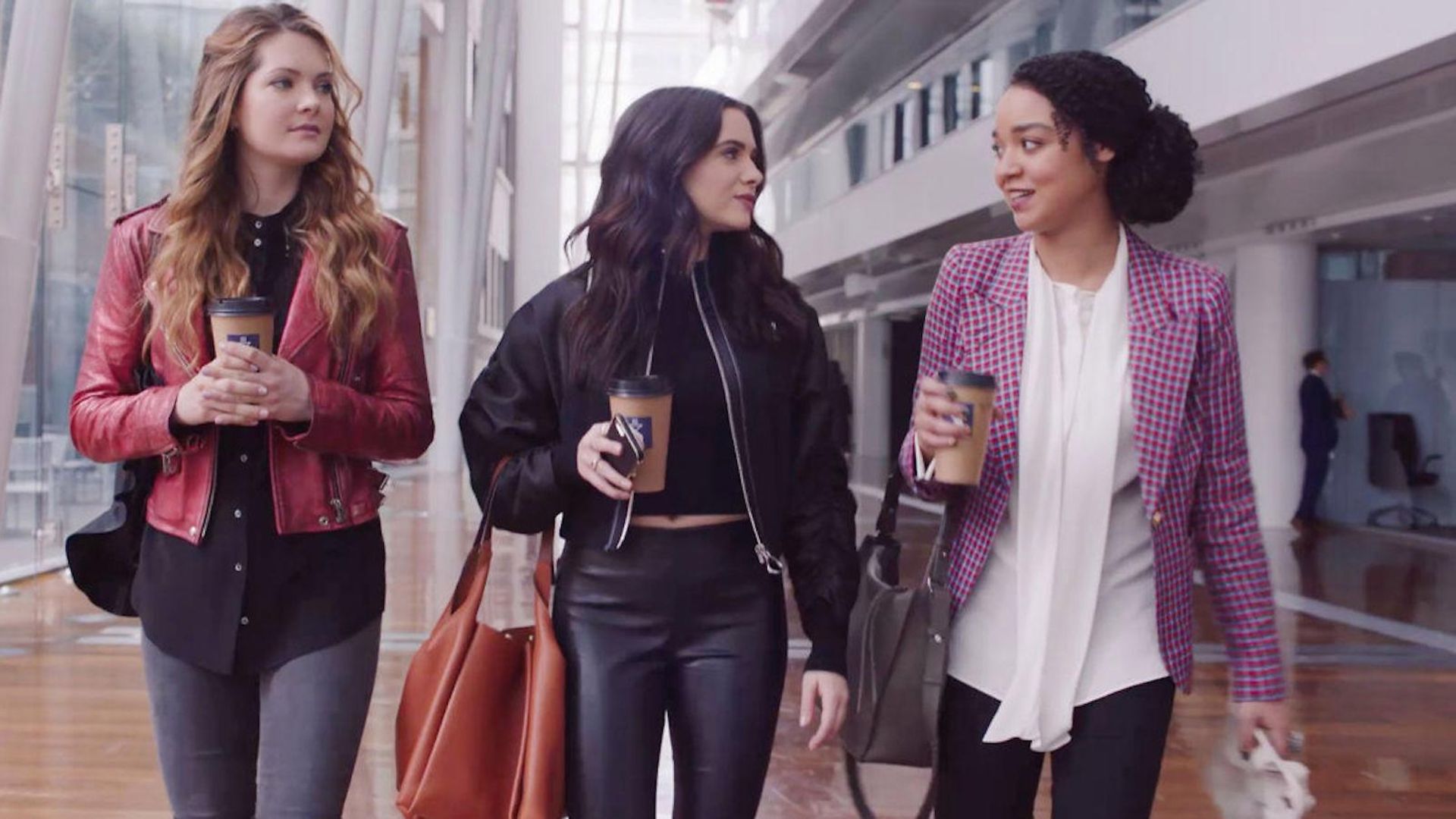
New columnist MEGAN NOLAN on The Bold Type, a pleasing Netflix series which tries just a little too hard to hit the zeitgeist
In late February, knowing we were still a substantial chunk of time away from being legally allowed to hang out with people again, I decided I needed just one more sustained volley of passive watching. I was on the hunt for a new show to sometimes watch and sometimes ignore, a white noise accompaniment to the last lonely stretch.
My best friend and I have been discussing lately all the complete series of television we watched since March 2020 and could barely recount the plots. They hardly registered even in the moments I was seeing them, let alone afterwards. Tiger King who?
Netflix has always operated for certain people as soothing background presence as much as actual entertainment, and certainly I found this increased during lockdowns. I live alone and on days I wasn’t working, particularly on days I was hungover or tired or sad, I often had some show playing ambiently throughout.
It has to be something not prestige or exciting enough that you feel bad for half-ignoring it. But it must also have enough dynamism that the pointlessness of your endeavour, of trying to stave off dread and solitude with television, doesn’t feel glaringly obvious.
I settled on The Bold Type, a recent Netflix transplant which originally aired on Freeform in 2017. It’s a dramedy following three young women, media workers in New York. They are Jane (Katie Stevens) Kat (Aisha Dee) and Sutton (Meghann Fahy) and all are employed with varying levels of success at a women’s magazine called Scarlet.
Jane is a former assistant recently turned staff writer, Kat is a whizkid social media executive and Sutton is a languishing assistant trying to break into fashion. Scarlet is edited by Jacqueline Carlyle (Melora Hardin) who is like a sort of Good Witch version of Meryl Streep’s character Miranda Priestly in The Devil Wears Prada. Carlyle is just as intimidatingly groomed and glamorous and powerful as Priestly in that film, but lacks the withering glances and incisive insults, and the totalitarian approach to producing her magazine. Instead she is an improbably nurturing, grounding presence in the lives of her three 25-year-old employees.
The entire show is a glossy and stylised look at the world of media, but Carlyle’s sassy yet saintly unbreakable persona is for me the most comically unrealistic. Not only must she produce a magazine in a landscape of declining print sales and keep afloat within a board composed of misogynistic corporately-minded old men, but she also finds time to tailor pep talks for the three dolts she has employed about their personal and professional quandaries.
I buy that there are exceptionally supportive, inspirational editors out there who want to help grow the careers of their employees, but I don’t buy this level of genuine interest. Is anyone at all this interested in the lives of 25-year-olds except 25-year-olds? Jacqueline, you want to say, you’re a grown woman, your industry is going down the toilet and your marriage isn’t far behind – for God’s sake stop asking the gang about their personal issues and concentrate on your own.
Kat is falling in love, struggling with her emerging queer identity and figuring out how her status as a mixed race gay woman can be both used against her and used as a tool for leverage online.
Sutton is having an illicit affair with a high up executive within the magazine’s board, afraid to go public lest it damage her ability to be respected professionally.
Jane, meanwhile, has the perpetual affect of a disappointed middle aged woman forced to toil on her feet for 40 years despite being a stunningly beautiful young person swanning about New York bars in heels and a fresh blow dry.
Her constant torment is at odds with the unearned ceaseless celebration for what only ever appears to be mediocre work summarising pre-existing zeitgeist topics. She obtains an unspeakable boyfriend, Ryan, a meritless chump whose only apparent attraction is that sort of acute boyband handsomeness which is so painfully earnest that its wearer looks almost cross eyed.
Ryan somehow pulls off the trick of being simultaneously a prolific shagger who loves to bore on about what new positions he’s trying that week, and also entirely, tragically sexless as a human being.
There is much to scoff at (Jane’s eagerness to burst into song every time they go to a bar, for instance, a jarring recurrence one can only assume came about at the request of the actress playing her) but very little to hate in The Bold Type.
It uses its glossy vantage point to highlight many important issues, which is part of why so many people like it and feel sincere attachment to the gang.
This is not the case for me. I understand this may be due to nothing more than my crippling emotional repression, but I find it difficult to abide that particularly American style of televisual moralising, the prescriptive feeling-and-growing, the Very Special Episode.
What I find especially uncomfortable is when these issue episodes are directly adapted from real life recent events. Other US shows like The Good Wife do this frequently too, taking a splashy news story and lightly fictionalising it in what feels like impossibly rapid turnover time.
The inevitably coherent sewing up of plotlines in shows such as these mean that stories from actual life are rendered farcically contained and neat. In The Bold Type there is an episode addressing the idea of “Nice guys” whose belief in their own moral superiority blinds them to their own casual misogyny.
A pleasant male colleague named Alex finds out that a viral short story named Too Cold To Walk about coercive sexual practices is about him, written by a former classmate named Kirsten (the story is clearly based on the viral New Yorker story named Cat Person by Kristen Roupenian about the same issue).
In The Bold Type Alex initially resists the accusation and insists it was a fully consensual experience, but eventually understands his behaviour as having been wrong whereupon he writes a confessional article for the magazine reconciling himself to his flawed behaviour and endeavouring to do better. Kirsten texts him to thank him for being an ally. Of course. Personally I like the show in spite of rather than because of these false little fables.
I think I like it for the perverse thrill of objection from seeing a world you know well rendered all glamour and full of easily parcelled out lessons, resolvable problems.
Granted, I’ve never been employed full time at a women’s magazine. But I’m just a few years older than Jane and became a professional writer in the same era that she did, so there is the moreish bitterness of watching and thinking: Oh it’s nothing like that. Oh it’s much, much worse than that. Oh you could never afford that bag. I hope you’re saving, Jane, because you’re all undergoing mass redundancy any day now.
There is something deliciously arcane, darling almost, in her insistence in 2018 that she doesn’t write for “dot com”, only for print. I like The Bold Type, probably, for the same reason I like watching most things – because I enjoy to see fantasy versions of my own reality played out by extremely hot people wearing nicer clothes than me, and this one has the bonus of being about the media too.
Warning: Illegal string offset 'link_id' in /mnt/storage/stage/www/wp-includes/bookmark.php on line 357
Notice: Trying to get property 'link_id' of non-object in /mnt/storage/stage/www/wp-includes/bookmark.php on line 37







